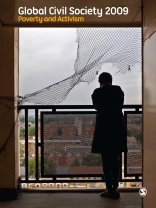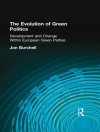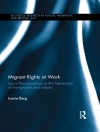The annual Global Civil Society Yearbooks provide an indispensable guide to global civil society or civic participation and action around the world. The 2009 Yearbook explores the framings, strategies and impacts of a range of actors on poverty and its alleviation. The overarching question is to whether such actors, in pressing for poverty alleviation actually achieve anything/empower the poor, or simply aid wealthy states in maintaining the status quo. The contributors are diverse, including scholars and practitioners from India, America, the UK, Australia, Thailand, and Mali.
The Global Civil Society Yearbook remains the standard work on all aspects of contemporary global civil society for activists, practitioners, students and academics alike. It is essential reading for anyone seeking a deeper understanding of the key actors, forms and manifestations of global civil society around the world today.
Inhoudsopgave
Introduction – Mary Kaldor, Ashwani Kumar & Hakan Seckinelgin
1. Poverty Discourses and Global Civil Society – Harsh Mander, Virginia Xaxa, Lakshmi Lingam & Amita Bhide
2. Global Poverty Statistics and Civil Society – Sally Stares
3. Bringing Justice and Culture Back in: Global Action for Local Livelihoods – Smitu Kothari
4. Global Organisation in Civil Society: the Effects On Poverty – Jan Aart Scholte & Jill Timms
5. Global Civil Society and Budget Participation – Celine Tan
6. Faith-Based Action in Development and Humanitarian Work – Khaled Mansour and Heba Raouf Ezzat
7. Living in the Shadows: Injustice, Racism and Poverty in the India Diaspora – Vinay Lal
8. Economic Migrants, the Banana Supply Chain, and the London Living Wage: Three Cases of Global Civil Society Activism on Poverty – Laurie Berg & Anna Samson, Pamela K Robinson, & Jane Wills
9. Viewing Restricted: [Re]Presenting Poverty – Jessica Dimmock, Mishka Henner, Sharron Lovell, Subhash Sharma & Ali Taptik
10. Global Civil Society Forums and Poverty – Jan Aart Scholte, Renate Bloem, Richard Samans, Kumi Naidoo, Chantana Banpasirichote Wungaeo, Virginia Vargas, Barry Aminata Toure & Chandan Sengupta
Conclusion – Marlies Glasius & Jan Aart Scholte
Introducing Futures Research: Forecasting and Scenarios – Helmut Anheier & Hagai Katz
Data Programme
Chronology
Over de auteur
Helmut K. Anheier, Ph D, is President and Dean at the Hertie School of Governance, and holds a chair of sociology at Heidelberg University. He received his Ph D from Yale University in 1986, was a senior researcher at John Hopkins School of Public Policy, Professor of Public Policy and Social Welfare at UCLA′s Luskin School of Public Affairs, and Centennial Professor at the London School of Economics. Professor Anheier founded and directed the Centre for Civil Society at LSE, the Center for Civil Society at UCLA, and the Center for Social Investment at Heidelberg. Before embarking on an academic career, he served as social affairs officer to the United Nations. He is author of over 400 publications, and won various international prizes and recognitions for his scholarship. Amongst his recent book publications are Nonprofit Organizations – Theory, Management, Policy (London: Routledge, 2014), A Versatile American Institution: The Changing Ideals and Realities of Philanthropic Foundations with David Hammack (Washington, DC: Brookings, 2013) and The Global Studies Encyclopedia with Mark Juergensmeyer (5 vols, Sage, 2012). He is the principal academic lead of the Hertie School´s annual Governance Report (Oxford University Press, 2013-), and currently working on projects relating to indicator research, social innovation, and success and failure in philanthropy.












